Veer Savarkar’s ‘Indian War of Independence 1857’ is the world’s first history book that is distinguished from being banned even before publication. Vinayak Damodar Savarkar wrote the book in 1909 using the library of the India Office in London. For almost a year and a half, he took a dip in documents relating to 1857 and the great sea of British writings. Later, this book gained fame as the ‘Gita of revolutionaries’. It was translated into many languages. During that period, it was sold for three hundred rupees each. The book was also published by Madame Cama, Lala Hardayal, Subhash Chandra Bose and Bhagat Singh. The book was also read in the camps of the Azad Hind Fauj.
In 1908, Savarkar wrote in the French newspaper ‘Talvar’ – “The purpose of my book is not only to present the historical truth as a matter of fact but also to ignite the fire of revolution in the hearts of the people for the freedom of the motherland and to wage a second revolution war.”
This book grew out of an essay penned by Savarkar around 1908. The essay itself was a retort to the British Empire’s version of the 1857 rebellion. Based on just one chapter, “Swarajya and Swadharma”, which found its way to the intelligence department, the Marathi edition of the book was banned even before it was published. The British ensured that even the English edition could not come out in London or Paris. Eventually, it was published in the Netherlands and shipped to India disguised in covers of classics such as Don Quixote and Pickwick Papers! The ban stayed for some forty years.
All of 24 years old when he wrote it, it was Savarkar’s first foray into writing history. Till that point, the British had derisively referred to the first war of independence in 1857 as a “Sepoy Mutiny”, which had been swallowed whole by many Indians. And hence, ‘1857’ by Savarkar was a radical departure from the dominant narrative. The Indian War of Independence talked about how the events were a coordinated uprising against the British Empire on the strength of arms. It was an appeal to all Indians, Hindu or Muslim, rich or poor, to rise and shake off the yoke of the Empire, something which their forefathers had been martyred trying to do.
The British government gave the best review possible to the book by banning it. They banned it even before it was published.

Why indeed such harsh treatment for a book on a subject which had happened fifty years ago, at the time of writing? The British knew very well what they had to undergo to save their Indian Empire in 1857, and every effort since then had been to prevent the same explosive scenarios from coming again to India. A second 1857-type situation might well have ended the British Raj in India.
This book showed the scope and range of Savarkar’s understanding of Indian history. It was impossible to pen such a document without going through scores of books and reading about everybody from Alexander down to the British empire. Savarkar also addresses the reasons behind some defeats in Indian history, pointing to social and cultural constructs which prevented victories from being full and comprehensive and, in some cases preventing a fightback in the first place (injunctions over crossing the Indus and the high seas). He realised that there were social ills within society, such as the caste system, which had caused a lot of damaging fallout, like failure to effectively counter combating invaders. He wrote extensively against it and, in fact, brought this into practice. Savarkar actively took part in social reforms in Ratnagiri, the district to which he was confined on his return from the Andaman. He established temples for people of all castes to pray with and a café where all castes would dine together.




















Comments